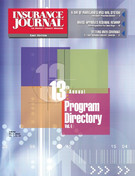Medical people, police, lawmakers and drivers are preparing for a conference on safe driving in New Hampshire–tackling traditional topics such as driver’s education and road design, but also looking at an increasing problem: should drivers with medical problems be behind the wheel?
With Americans living longer, more have medical conditions that could impair their drive ability. New Hampshire is one of a few states that track crashes related to medical events or illness. Last year, state officials determined that medical events caused nine fatal crashes. Sixty-seven others were blamed in part on physical impairment or illness. So far this year, five fatal crashes in New Hampshire have been caused by medical conditions.
Sponsors of the “Safe Driving Summit,” set for Dec. 9 at the Radisson Hotel and Conference Center in Merrimack, hope the event will be the same kind of catalyst for change that a meeting last year on drunken driving proved to be. The legislature subsequently tightened drunk driving laws.
In New Hampshire, drivers 75 and older must take a road test along with the standard vision test when they renew their licenses every five years. The state can require younger drivers to take a road test if the state believes the driver might be a driving hazard because of “an apparent psychological or physical impairment.”
But Dr. Joseph Sabato, medical director for Nashua’s Division of Public Health, who is organizing the meeting, said unlike many states, New Hampshire has no system for doctors to report patients with medical conditions that could impair their driving. “If I, as a physician, see somebody who I think may be impaired, I can refer him, but I’m open to liability because that’s not protected in New Hampshire,” he told the New Hampshire Sunday News.
Reporting medical conditions to the state makes some uneasy. Sabato said that’s why he hopes the conference will lead to a New Hampshire style response. “If the only thing that comes out of this summit is we’re able to get information out to physicians that helps them when they evaluate patients, we’ve done a service,” he said.
The speaker’s list includes Dr. Phillip Brewer, a professor of emergency medicine at Yale Medical School, who also was a safety fellow for the National Highway Traffic Safety Administration. Brewer believes policymakers must look at more than drivers to address the problem. He cites everything from building less complicated cars to changing zoning so that older people can walk to stores.
“The bottom line is we need to be more effective about weeding out medically impaired drivers, but we also need to do something for those people so that they still have a life when they can’t drive anymore,” he said.
New Hampshire officials have some company as they begin their inquiry into the medical condition of drivers.
Last month, the National Transportation Safety Board called for a national system for collecting data about the medical conditions of drivers involved in crashes. It also calls for doctors to report to state agencies patients who shouldn’t be driving.
The Federal Highway Administration recently issued guidelines for highway design that could make navigating easier for older drivers. They included improved lighting, pavement markings, road signs and left-turn lanes.
Also, the American Medical Association contributed to a “Physician’s Guide to Assessing and Counseling Older Drivers.” It contains a list of medical conditions that may impair driving.
Topics Personal Auto
Was this article valuable?
Here are more articles you may enjoy.


 Trapped Tesla Driver’s 911 Call: ‘It’s on Fire. Help Please’
Trapped Tesla Driver’s 911 Call: ‘It’s on Fire. Help Please’  Beazley Agrees to Zurich’s Sweetened £8 Billion Takeover Bid
Beazley Agrees to Zurich’s Sweetened £8 Billion Takeover Bid  Howden-Driven Talent War Has Cost Brown & Brown $23M in Revenue, CEO Says
Howden-Driven Talent War Has Cost Brown & Brown $23M in Revenue, CEO Says  Chubb Posts Record Q4 and Full Year P/C Underwriting Income, Combined Ratio
Chubb Posts Record Q4 and Full Year P/C Underwriting Income, Combined Ratio 


